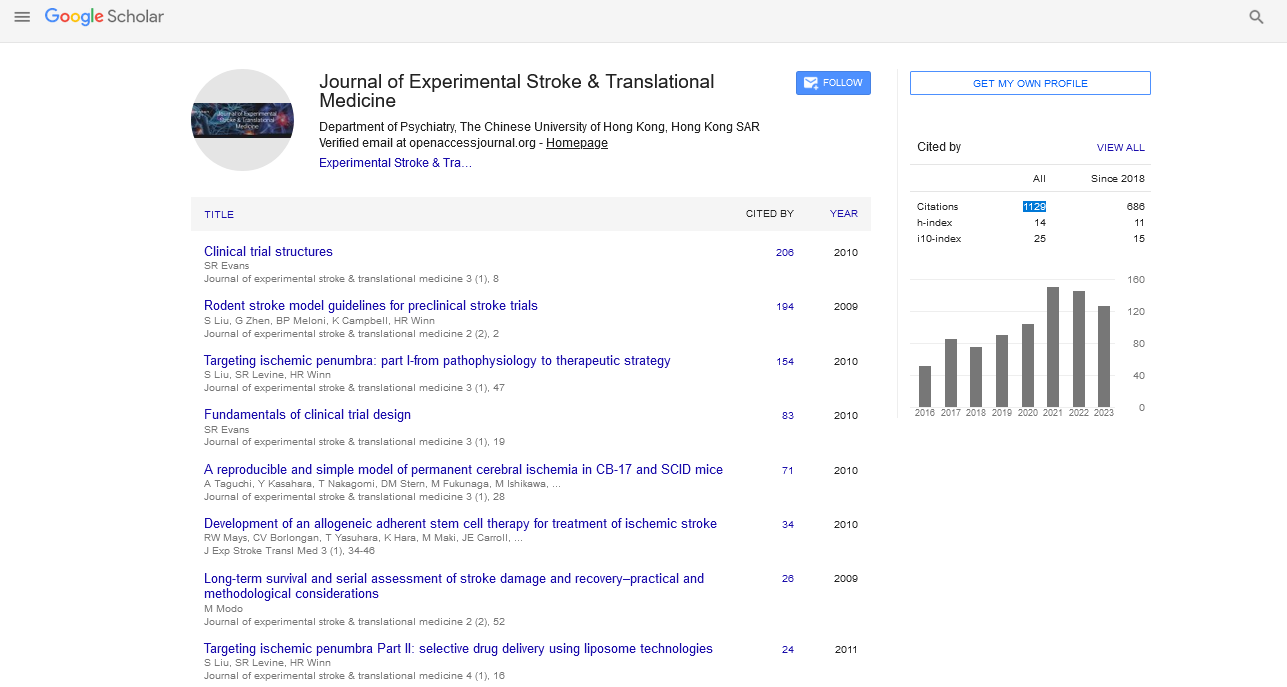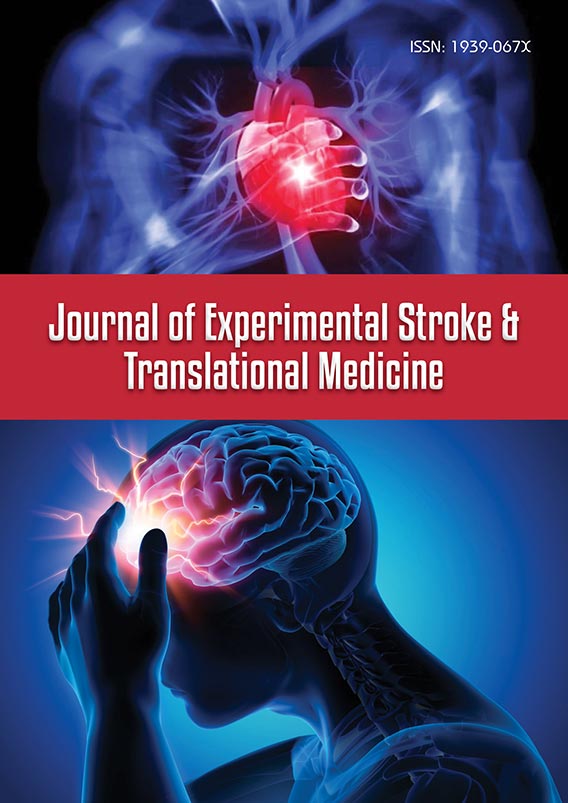Perspective - Journal of Experimental Stroke & Translational Medicine (2023) Volume 15, Issue 5
Unraveling the Promise of Translational Medicine: A Journey from Bench to Bedside
- Corresponding Author:
- Franklin D. West
Department of Cardiology,
Texa Colombia University,
Texas,
USA
E-mail: west@uga.edu
Received: 18-Sep-2023, Manuscript No. jestm-23-118764; Editor assigned: 21-Sep-2023, PreQC No. jestm-23-118764 (PQ); Reviewed: 05-Oct-2023, QC No. jestm-23-118764; Revised: 20-Oct-2023, Manuscript No. jestm-23-118764 (R); Published: 30-Oct-2023, DOI: 10.37532/jestm.2023.15(5).107-109
Introduction
Translational medicine is a multidisciplinary field that represents the pivotal bridge between fundamental scientific research and tangible clinical applications in healthcare. It encompasses a continuum, driving discoveries from laboratory benches to the bedside of patients. In this, we delve into the significance of translational medicine, its transformative impact on healthcare and its promise in shaping the future of medical research and patient care.
Description
Translational medicine defined
Translational medicine involves the seamless translation of scientific r esearch d iscoveries i nto practical clinical applications. It covers a spectrum of research phases, where the knowledge generated in basic science (often referred to as “bench” research) is translated into clinical applications (the “bedside”) to improve patient outcomes and healthcare practices. This process is divided into several phases:
T1-Bench to bedside: This phase focuses on translating basic research findings into potential clinical applications. Researchers aim to identify targets for intervention based on their understanding of disease mechanisms.
T2-Clinical implementation: In this phase, the research shifts from the laboratory to clinical testing. Clinical trials are conducted to evaluate the safety and efficacy of interventions developed in T1, often involving a small group of patients.
T3-Clinical practice guidelines: Once an intervention demonstrates promise in clinical trials, T3 researchers work to develop evidence-based clinical guidelines. These guidelines ensure the treatment is used effectively and consistently in clinical practice.
T4-Population health impact: The final phase evaluates the broader impact of an intervention on population health. Researchers assess how the treatment influences public health outcomes and may shape healthcare policy decisions.
Significance of translational medicine
Translational medicine has immense significance in contemporary healthcare, bringing about a multitude of transformative changes:
Acceleration of medical discoveries: Translational medicine expedites the translation of laboratory discoveries into clinical applications. This acceleration ensures that promising treatments reach patients faster, potentially saving lives and improving healthcare outcomes.
Precision medicine: The field of translational medicine has paved the way for the development of personalized or precision medicine. By understanding the genetic and molecular foundations of diseases, treatments can be tailored to individual patients for improved outcomes and fewer adverse effects.
Reduction in drug development costs: The early identification of promising drug candidates within the translational process helps cut costs and reduces the time required for drug development. This serves as a significant benefit for both pharmaceutical companies and patients.
Enhanced patient outcomes: Translational medicine ensures that clinical practices are based on the most up-to-date scientific evidence. This leads to better treatment options and improved patient outcomes.
Bridging the gap: Translational medicine aligns the efforts of researchers, clinicians and industry professionals, creating a united approach to healthcare advancements. It bridges the gap between theoretical discoveries and practical, patient-centered solutions.3
Challenges in translational medicine
While the prospects of translational medicine are bright, it does come with its set of challenges:
Interdisciplinary collaboration: Effective translational research demands seamless collaboration between diverse professionals, including basic scientists, clinicians, pharmacologists, bioinformaticians and regulatory experts. bridging these gaps can be challenging.
Funding and resources: The m ultidisciplinary nature of translational research requires substantial funding and resources. Consistently securing financial support is crucial for sustaining translational research efforts.
Regulatory hurdles: Navigating the complex regulatory pathways, especially during the clinical testing phase, can be time-consuming and expensive. Striking the right balance between safety and speed poses a considerable challenge.
Data integration: Managing and integrating vast amounts of data from various sources, including genomics, proteomics, and clinical records, can be complex. Developing effective data-sharing platforms and ensuring data integrity are essential.
Ethical concerns: Balancing the need for research progress with ethical considerations, such as patient privacy and consent, is an ongoing challenge in translational medicine.
Case studies in translational medicine
Cancer immunotherapy: The development of immunotherapies, such as immune checkpoint inhibitors, exemplifies the success of translational medicine. Basic research into the immune system’s role in cancer led to the development of groundbreaking treatments like pembrolizumab and nivolumab. These drugs have revolutionized cancer treatment and improved patient outcomes.
Stem cell therapy: Translational research in stem cell biology has led to promising regenerative medicine applications. For instance, stem cellbased therapies for conditions like spinal cord injuries and heart disease are moving from the laboratory to clinical trials.
Pharmacogenomics: Translational medicine has made significant progress in the field of pharmacogenomics, where genetic information is used to personalize drug treatments. This approach has led to more effective and safer medication management for various conditions, including depression, cancer and cardiovascular diseases.
Rare disease research: Translational medicine has been instrumental in advancing research and treatments for rare diseases. By bringing together researchers, clinicians and patients, it accelerates the development of orphan drugs and therapies for rare conditions that might otherwise be neglected.
The future of translational medicine
Translational medicine is poised to play an even more crucial role in healthcare and medical research in the future. Several key developments can be anticipated:
Artificial intelligence and big data: Advances in artificial intelligence and data analysis will help researchers make sense of the vast amount of information generated in translational studies. This will enhance our understanding of disease mechanisms and enable more personalized treatments.
Gene editing and CRISPR: Gene editing technologies like CRISPR-Cas9 have the potential to revolutionize the treatment of genetic diseases. Translational research will be critical in bringing these therapies from the lab to the clinic.
Virtual clinical trials: The integration of digital health tools and telemedicine will make it easier to conduct clinical trials, increasing accessibility and reducing patient burden.
Patient-centered research: Involving patients in the research process is becoming more common in translational medicine. Patient perspectives and insights are invaluable in shaping research priorities and treatment development.
Conclusion
This, along these lines, implies extra weight to relatives. Besides, care given to stroke casualties is costly. Hardware for supporting stroke casualties are costly and perhaps excessively expensive to certain families. With an end goal to adapt up, the family surrenders itself to monetary limitations that might influence the general prosperity of the remainder of the family. Also, powerlessness to give care might cause mental injury among relatives. Thirdly, stroke might cause demise. However this for the most part happens to the old populace, it denies groups of cultural symbols. Perished individuals go through mourning, which causes mental aggravation. The illness, consequently, is of general wellbeing worry as it brings the personal satisfaction down to either the impacted individual or close family.

